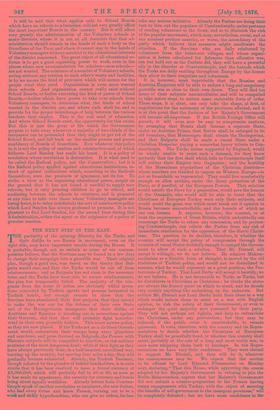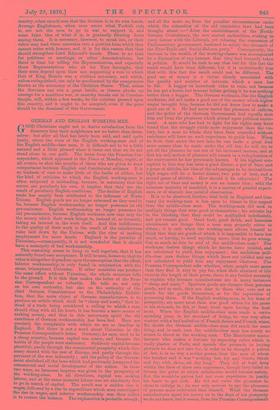TFIE NEXT STEP LN THE EAST.
MHE partiality of the existing Ministry for the Turks, and 1. their dislike to see Russia in movement, even on the right side, may have important results during the Recess. It is probable, though not so certain as some of our contem- poraries believe, that the Servians may be forced in a few days to change their campaign into a guerrilla war. Their original plan, though a good one, was based on the theory that Bul- garia would rise, and that the Turks would be cut off from reinforcements ; and as Bulgaria has not risen in the necessary force, and the Turks have been able to secure reinforcements, the plan has temporarily failed. The majority of the tele- grams from the scene of action are obviously wilful inven- tions concocted by Turkish agents and persons interested in Turkish bonds, but enough remain to show that the Servians have abandoned their first projects, that they intend to make the war one for the defence of their own State and of the Herzegovinian insurgents, that their dislike of Austrians and Rpssians is breaking out in accusations against their Generals, and that they will probably fight hencefor- ward in their own guerrilla fashion. This is not unwise policy, as they are now placed. If the Turks act as a civilised Govern- ment would, concentrate their troops, hang every .plunderer and murderer, and press forward on Belgrade, the Powers with Slavonic subjects will be compelled to interfere, or risk military mutinies of the most dangerous kind ; while if they fight as they have always previously done, in a half-hearted, uncivilised way; burning up the country, but moving four miles a day, they will gradually become exhausted. Already, the Turkish Treasury, though relieved by the plunder of Infidel bondholders, is in such straits that it has been resolved to issue a forced currency of £3,000,000, which will probably fall to 50 or 60, as soon as it has made its appearance, the security for currency and bonds being about equally worthless. Already letters from Constan- tinople speak of another revolution as imminent, the new Sultan, who had every virtue and knew French, turning out to be a weak and sickly hypochondriac, who can give no orders, far less
take any serious initiative. Already the Pashas are doing their best to thin out the populace of Constantinople, under peetenee of sending volunteers to the front, and so to diminish the risk of the popular movement, which may, nevertheless, occur, and at any moment produce anarchy, or worse, the ascendancy of the party which believes that massacre might ameliorate the situation. If the Servians who are daily reinforced by volunteers from the burnt-out villages, and whose orgaan- sation is better calculated for defensive than offensive war, can but hold out as the Carlists did, they will have a powerful ally in the disorder at Constantinople, and the hatreds which the Turks are daily exciting throughout Europe by the license they allow to their irregulars and volunteers.
It is, however, most improbable that the Russian and Austrian Emperors will be able to endure a long and sanguinary guerrilla, war so close to their own doors. They will find too many of their subjects uncontrollable, and will be compelled to take active steps to restore some endurable form of order. These steps, it is clear, can only take the shape, at first, of negotiations for the autonomy of the provinces affected, and it is at this point that the decision of her Majesty's Government will become all-important. If the British Foreign Office will permit, it will even now be easy to compromise matters, by arranging that Bosnia shall become a separate State, under an Austrian Prince, that Servia shall be enlarged to its old boundary, that Montenegro shall obtain the Herzegovina, and that Bulgaria shall be made a vassal State under a Christian Hospodar, paying a somewhat heavy tribute to Con- stantinople. The Turks, unless supported by England, would be wholly unable to resist such a demand, for they know perfectly that the first shell which falls in Constantinople itself
will scatter their Empire into fragments ; and the hostility of the Mussulruan populations of the Christian districts—
whose numbers are falsified to impose on Western Europe—is not so formidable as represented. They could live comfortably enough as alien settlers, under the direct protection of the Porte, or if needful, of the European Powers. This solution would satisfy the Slays for a generation, would save the honour of the Osmanlis, who would still be able to boast that the Christians of European Turkey were only their subjects, and would avoid the great war Which must break out if opinion in Russia becomes uncontrollable, and the bounds of which no one can foresee. It requires, however, the consent, or at least the acquiescence of Great Britain, which undoubtedly can encourage the Turks to refuse any concession, and by protect- ing Constantinople, can relieve the Pashas from any risk of immediate retribution for the oppression of the Slavic Christ- ians. The question to be decided, therefore, is whether the country will accept the policy of compromise through the
creation of vassal States decidedly enough to compel the Govern- ment to allow of such a solution. That Mr. Disraeli will
accept it willingly, we do not believe. He admires Mahom- medanism as a Semitic form of thought, is moved by the old traditions of Turkish policy, and would not be disinclined to assume, what he would represent as a great position, the Pro- tectorate of Turkey. That Lord Derby will accept it heartily, we do not believe. He is not favourable to Turks as Turks, but
he disbelieves in Christians as Christians ; he thinks the status quo always the firmest point on which to stand, and he dreads very acutely anything like embarking on the unknown. But
neither Mr. Disraeli nor Lord Derby hold their ideas in a way which would induce them to enter on a war with English opinion, to risk the safety of their Government, or even to endanger the quiet majority now possessed by their party. They will not perhaps act rightly, and help to enfranchise the Christians, under any provocation; but they may be induced, if the public voice is unmistakable, to remain quiescent. It rests, therefore, with the country and its Repre- sentatives to decide whether the Christians of European Turkey shalt be peacefully freed, or whether this country shall assist, probably at the cost of a long and most costly war, in once more whipping them back to bondage. In the Repre- sentatives we have very little confidence. They were elected to support Mr. Disraeli, and they will do it, whatever
the consequences may be. We expect that the motion to be offered by Lord Edmond Fitzmaurice on Monday
next, declaring," That this House, while approving the course adopted by her Majesty's Government in refusing to join the Berlin Memorandum, regrets that her Majesty's Government did not submit a counter-proposition to the Powers having treaty engagements with Turkey, with the object of securing the benefits of self-government to the insurgent provinces," will be completely defeated ; but we have more confidence in the country, when once it sees that the decision is in its own hands. Average Englishmen, when once aware what Turkish rule is, are not the men to go to war to support it, and some faint idea of what it is, is gradually filtering down among them. It is necessary, however, to speak out, or their rulers may lead them unawares into a position from which they cannot retire with honour, and it is for this reason that they should strengthen Lord Edmond's hands. There is no time for petitions or meetings, or other demonstrations, but there is time for telling the Representatives, and especially those Representatives who sit for Tory boroughs, that their seats depend upon their not supporting a rule to which that of King Bomba was a civilised autocracy, and which, unless extinguished, can only be ameliorated by the compromise known as the autonomy of the Christian States. That, unless the Servians can win a great battle, or Greece plucks up courage for a maritime war, or anarchy breaks out in Constan- tinople, will, within a few weeks, be the solution pressed upon this country, and it ought to be accepted, even if the price should be the dismissal of this Government.



































 Previous page
Previous page